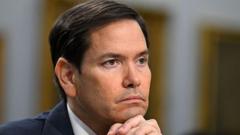The Trump administration opens a pathway for coal and oil companies to bypass new environmental regulations by emailing for exemptions, raising concerns over public health repercussions.
**Trump Administration Invokes Clean Air Act for Industry Exemptions**

**Trump Administration Invokes Clean Air Act for Industry Exemptions**
A controversial move by the EPA allows pollution exemptions for power plants under Trump’s administration.
In a significant policy shift, the Trump administration is enabling coal- and oil-burning plants to potentially circumvent recently established emissions regulations. This comes after the Biden administration had implemented stringent rules aimed at reducing toxic emissions, including mercury—a known detriment to children's brain development and adult health. The EPA has introduced an unexpected measure: companies may submit requests via email for exemptions from these new restrictions, with the implication that President Trump will personally evaluate their requests.
Citing an obscure provision of the Clean Air Act, the EPA alleges the president can exempt industries under two conditions: the unavailability of necessary technology for compliance or national security concerns. This development has drawn criticism from various quarters, including Joseph Goffman, a former EPA assistant administrator, who warned that this could lead to excessive exemptions and undermine established air quality standards.
The template provided by the EPA for exemption requests outlines how companies should ask for leniency, effectively streamlining the approval process. Critics argue that this approach may diminish the regulatory authority of the EPA and set a dangerous precedent in environmental governance. Proponents of the move, however, contend that it may assist industries in adapting to significant regulatory changes without risking financial viability in an increasingly competitive market.
This development marks a polarizing moment in the ongoing debate over environmental policy and public health, as the implications of favoring industrial interests could resonate through both political and public health channels.
Citing an obscure provision of the Clean Air Act, the EPA alleges the president can exempt industries under two conditions: the unavailability of necessary technology for compliance or national security concerns. This development has drawn criticism from various quarters, including Joseph Goffman, a former EPA assistant administrator, who warned that this could lead to excessive exemptions and undermine established air quality standards.
The template provided by the EPA for exemption requests outlines how companies should ask for leniency, effectively streamlining the approval process. Critics argue that this approach may diminish the regulatory authority of the EPA and set a dangerous precedent in environmental governance. Proponents of the move, however, contend that it may assist industries in adapting to significant regulatory changes without risking financial viability in an increasingly competitive market.
This development marks a polarizing moment in the ongoing debate over environmental policy and public health, as the implications of favoring industrial interests could resonate through both political and public health channels.






















